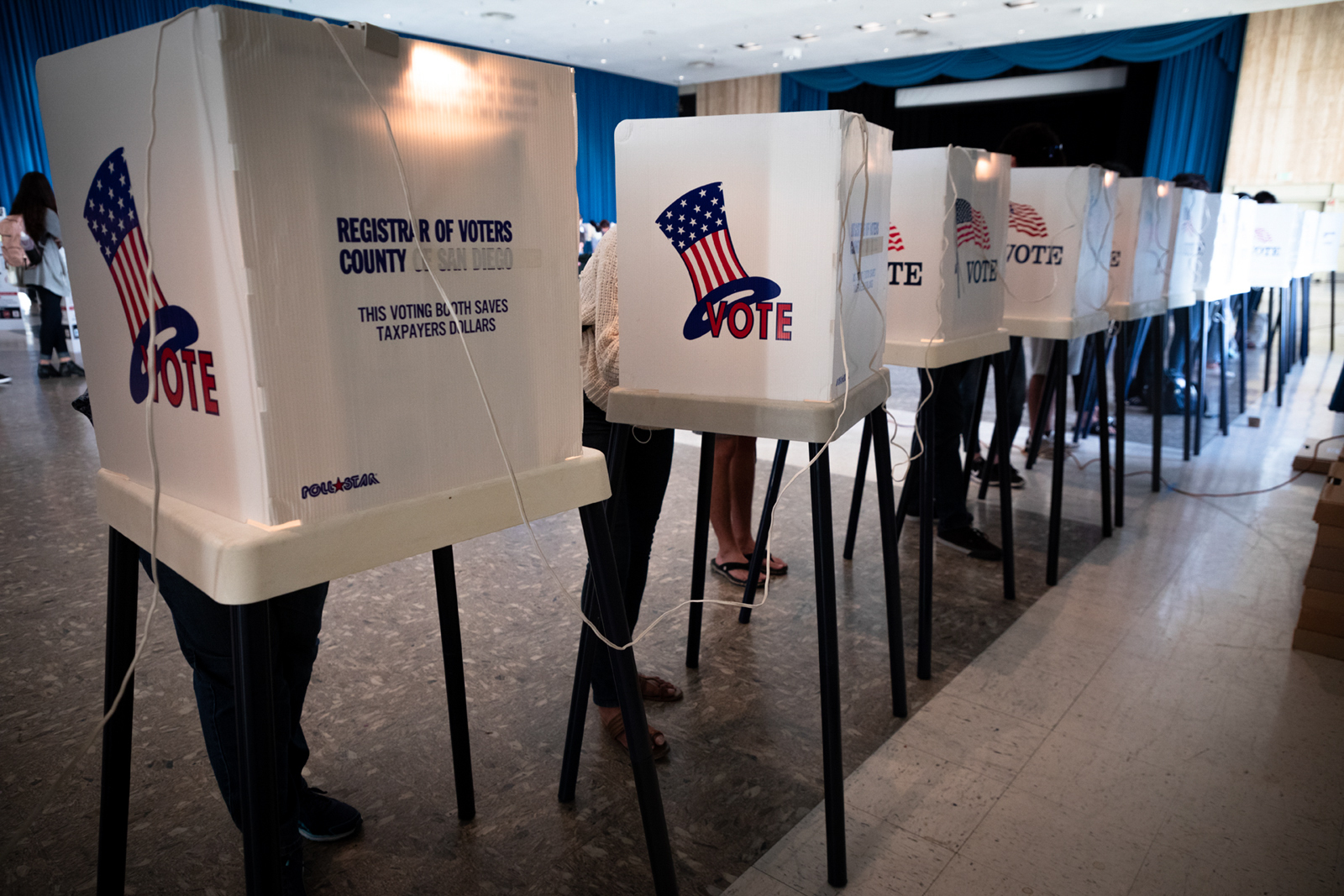UCLA report urges vote-by-mail, other provisions for elections during COVID-19

A paper from the UCLA Voting Rights Project is recommending that legislators adopt a vote-by-mail system in order to ensure that people can continue to vote throughout the coronavirus pandemic. Some states across the United States have postponed primary elections because of concerns over the pandemic. (Daily Bruin file photo)

By Eshan Uniyal
April 16, 2020 6:45 p.m.
This post was updated April 17 at 10:23 p.m.
A recent report from the UCLA Voting Rights Project recommends that legislators and election officials start considering a vote-by-mail system to preserve Americans’ right to vote in the upcoming primary and general elections.
The paper, which was published March 23 by the Voting Rights Project, an advocacy program of the UCLA Latino Policy & Politics Initiative, emphasizes the need to expand access to vote-by-mail in light of the coronavirus pandemic, which has led many states to postpone their primary elections.
Sonni Waknin, a legal fellow for the Voting Rights Project who co-authored and coordinated the research for and production of the paper, said she thinks vote-by-mail is the system best suited to meet the need of the hour.
“Right now, models show that there’s a possibility of the pandemic spiking again in October, November and December, kind of similar to how the flu weaves in and out,” Waknin said. “If that occurs, people are going to have to social distance, and with social distancing comes not being able to vote in person.”
Even if the coronavirus were to subside, voters are still likely to avoid large gatherings which are common at in-person voting centers, Waknin said. Vote-by-mail is a safer alternative to traditional in-person voting since the risk of transmission is “theoretical and minimal,” according to the paper.
Chad Dunn, director of litigation at the Voting Rights Project and a co-author of the paper, said he thinks in-person voting will likely still need to be an important part of the electoral process, but added legislators must plan to take the pressure off it by implementing wide-scale vote-by-mail.
“The idea is an all-of-the-above strategy,” Dunn said. “We have in-person voting, we ramp up vote-by-mail, make it universal. We begin preparing for it now, printing the ballots, building the scanners, training the staff and assigning other government staff that’s otherwise furloughed during this work as essential election personnel.”
In addition to introducing universal vote-by-mail, the paper also recommends modifying in-person voting centers to limit person-to-person contact, establishing secure and accessible ballot drop-off locations and implementing measures to ensure voting security and equity.
Even in the absence of a pandemic, vote-by-mail can increase voter convenience, potentially improve voter turnout and strengthen security from digital hacking efforts, Dunn said.
“It substantially lowers the burden to vote,” he said. “It also gives voters the opportunity to consider their ballot. You’re not queued up in a line and people are waiting for you to vote and get out of the way, … and in a lot of ways, it’s more secure.”
Dunn added he thinks the current situation in particular calls for Congress to establish standardized guidelines and funding for states to implement vote-by-mail.
“The point is, right now, we don’t have a choice,” Dunn said.
However, there are some challenges with implementing a universal vote-by-mail system, such as the screening of ballots, language accessibility and the potential for disparate impact on communities unlikely to have permanent addresses or P.O. boxes.
Waknin said one significant challenge with vote-by-mail systems is that older voters and primarily voters of color can be disenfranchised through the signature verification process, in which the signature of the voter is used to confirm their identity. Signature verification is currently conducted with different standards across states.
“That’s why you need to have an alternative to signature verification … you need to have another alternative where voters are able to verify their identity,” Waknin said. “You also need to have a ‘curing period,’ which means that you notify voters when there is a discrepancy within their ballots, and they are given the opportunity to come in and correct, or ‘cure,’ any errors within their mail ballot.”
Even as Republicans rely on vote-by-mail in strongholds such as Utah and Arizona, there is fierce opposition to implementing universal vote-by-mail from the White House and Senate Republicans.
“All of the academic studies done on wide-scale vote-by-mail show that turnouts increase all around,” Dunn said. “The election results are more or less the same, but more people get to participate. And, you know, there’s some places where increased turnout benefits Republicans, (and) places where it benefits Democrats.”
Elisa Chang, a graduate student in education at UCLA and campaign coordinator for UCLA California Public Interest Research Group’s New Voters Project, said the campaigns she has been organizing also focus on vote-by-mail as the preferred way for students to vote in the upcoming primaries and presidential election.
“(Vote-by-mail) gives students the ability to vote from the comfort of their own home and send an absentee ballot,” Chang said.
However, Chang added that she thinks there needs to be public education on vote-by-mail and how students can go about it. The New Voters Project is working on increasing education around vote-by-mail and ensuring that mail ballots are accessible to everyone, Chang said.
“Vote-by-mail is just very easy and very accessible,” she said. “As long as you are registered to vote by the deadline (in California), you will receive your ballot prior to Election Day.”
The Voting Rights Project is urging Congress to ensure that any COVID-19 response bill that comes before the House and Senate includes a provision that requires sending vote-by-mail ballots to all registered voters, Waknin added.
“We’re (seven) months out from the election,” Waknin said. “This is the time that it needs to happen.”


